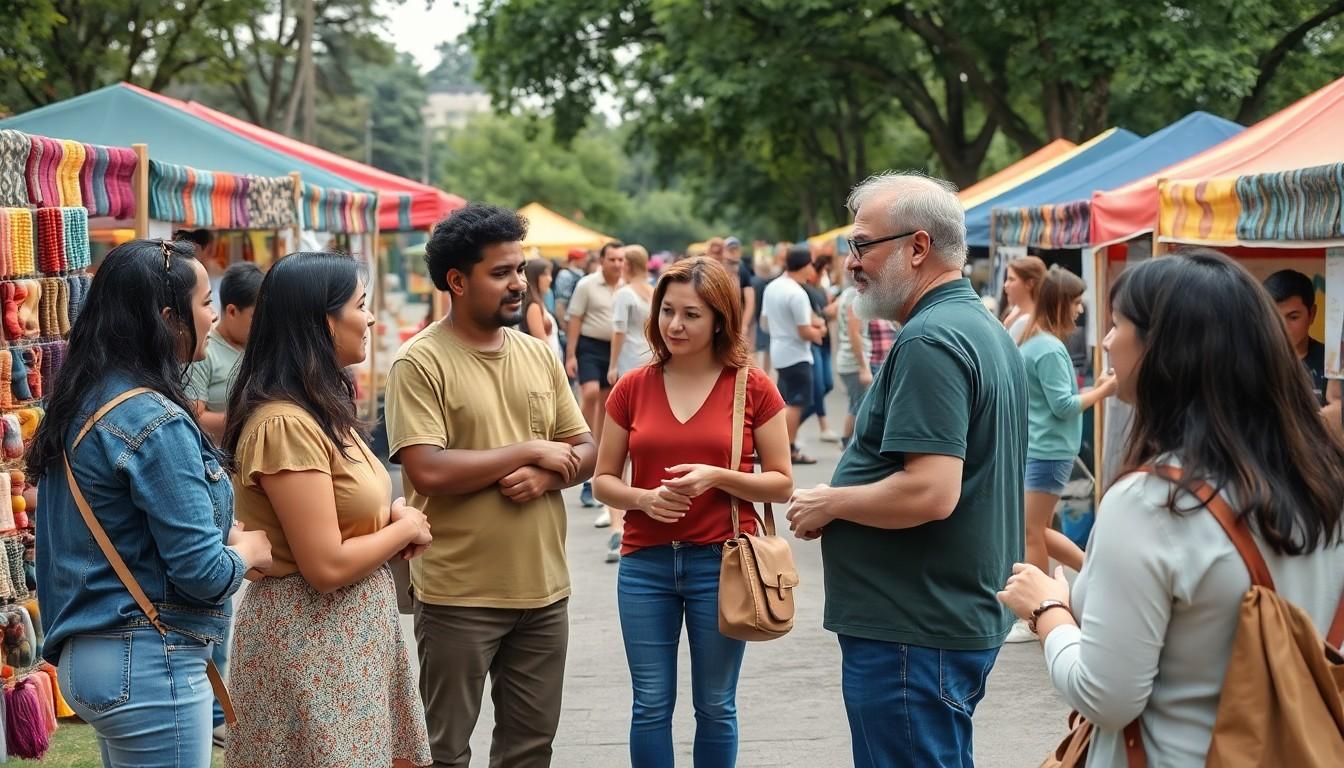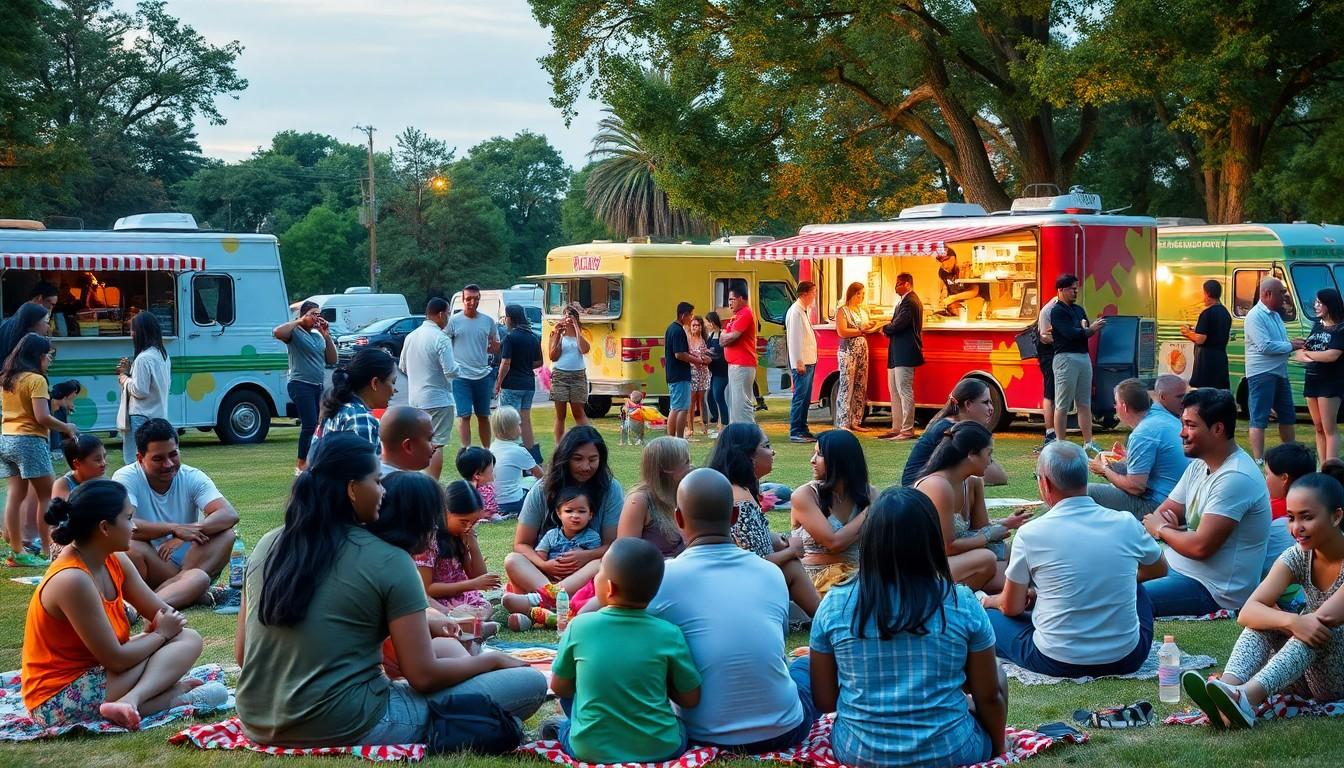Community engagement events are the secret sauce to a vibrant neighborhood. They’re not just a way to fill calendars; they’re the lifeblood that connects people, ideas, and laughter. Imagine a Saturday filled with food trucks, music, and friendly faces—sounds like a party, right? But it’s more than just fun; it’s about building relationships and fostering a sense of belonging.
community engagement events
Community engagement events play a critical role in fostering connections among residents. These gatherings create opportunities for interaction, allowing neighbors to meet and share experiences. Activities typically include food, music, and various entertainment options, appealing to all age groups.
Participants often engage in discussions that spark new ideas and collaboratively address local issues. Such events enhance social networks, helping individuals form friendships and partnerships that last beyond a single occasion. Regularly scheduled events increase participation and keep residents invested in their community.
Volunteers contribute significantly to the success of these gatherings. Their dedication ensures that activities run smoothly and that all attendees feel welcomed. Local businesses frequently support community engagement events by providing resources, sponsorship, or services. This collaboration strengthens economic ties and boosts local visibility.
Communities can organize various types of events, such as festivals, workshops, and clean-up days. Each type serves a distinct purpose while promoting involvement. Celebrations, for example, showcase cultural heritage and diversity. Educational sessions focus on skill-building and knowledge sharing.
Planning plays a crucial role in the success of community engagement events. Organizers should consider location, accessibility, and timing to maximize attendance. Promoting events through social media and local bulletins raises awareness and encourages participation. Regular evaluation of event impact helps identify areas for improvement and growth.
Effective community engagement creates vibrant neighborhoods that thrive on participation and connection. These events demonstrate that together, residents can build a stronger, more cohesive community.
Importance of Community Engagement Events

Community engagement events play a significant role in strengthening neighborhoods. These gatherings foster connections and enhance the overall quality of life within communities.
Benefits for Local Communities
Community engagement events yield numerous benefits for local communities. They boost local economies through increased foot traffic and patronage of nearby businesses. Organizing festivals or markets draws crowds, creating opportunities for vendors and artisans. Residents gain access to resources and services as local organizations set up booths to share information. Additionally, these events encourage participation in local initiatives, leading to more community-driven projects and improvements. Networking among residents results in collaborations that address shared concerns.
Enhancing Civic Participation
Civic participation thrives through community engagement events. These gatherings provide a platform for residents to voice their opinions and participate in decision-making. When people come together, they tackle local issues collaboratively, creating a sense of empowerment. Events foster dialogue among diverse community members, breaking down barriers and building trust. Workshops and forums specifically invite input from everyone, promoting inclusivity and representation. Increased civic participation cultivates a culture of responsibility and engagement, driving positive change within the community.
Types of Community Engagement Events
Community engagement events come in various forms, each serving a unique purpose while fostering connections among residents.
Workshops and Seminars
Workshops and seminars provide educational opportunities that empower residents. Participants can gain skills in various topics, from gardening to budgeting. These interactive sessions often encourage collaboration, ensuring attendees can share experiences and knowledge. Local experts often facilitate workshops, lending credibility and support. Additionally, these gatherings enable participants to network with like-minded individuals, expanding their community connections. Some workshops may even address specific needs within the community, such as job search strategies or health education resources. By emphasizing practical learning, these events promote personal growth and community development simultaneously.
Festivals and Fairs
Festivals and fairs celebrate local culture and initiatives while inviting residents to partake in festive activities. Many events feature food vendors, artisans, and live performances that showcase local talent. Residents find entertainment that appeals to all ages, creating an inclusive atmosphere. These gatherings stimulate local economies, as increased foot traffic benefits nearby businesses. Oftentimes, festivals include informational booths from community organizations, offering resources and services. Engaging in these festive occasions helps residents establish connections, strengthening neighborhood bonds. Ultimately, festivals and fairs highlight the vibrancy of local communities, encouraging ongoing participation and investment.
Strategies for Successful Community Engagement Events
Successful community engagement events require careful planning and thoughtful execution. Every detail contributes to the overall impact, ensuring a memorable experience for participants.
Planning and Organization
Organizing engaging events involves several key steps. First, define the event’s purpose, aligning it with community needs and interests. Next, select accessible venues, accommodating individuals of all abilities. Collaborating with local organizations enhances resources, allowing for more engaging activities. Create schedules that include diverse programming, balancing entertainment and educational content. Finally, assign clear roles and responsibilities to volunteers, streamlining operations and improving efficiency.
Promoting Inclusivity and Diversity
For community events to thrive, inclusivity and diversity must be prioritized. Encouraging participation from various demographics fosters a richer atmosphere. Catering to different cultural backgrounds through food, music, and activities broadens appeal. Outreach efforts should target underrepresented groups, ensuring their voices and experiences are acknowledged. Creating spaces for dialogue helps facilitate understanding and respect among attendees. Implementing feedback mechanisms post-event allows community members to express their needs, driving continuous improvement in future gatherings.
Measuring the Impact of Community Engagement Events
Measuring the impact of community engagement events involves various metrics, revealing the effectiveness of each gathering. Attendance numbers provide initial insights, showing how many residents participated and engaged with activities. Surveys conducted post-event help assess participant satisfaction and gather feedback on programming elements.
Community ties strengthen as these events unfold. Tracking social media interactions and engagement levels can reveal how discussions linger beyond the event. Observers can note improved collaboration among local organizations and residents, indicating potential for future initiatives.
Economic benefits serve as another critical metric. Increased traffic to local businesses often occurs before and during events, boosting sales. Analyzing local business growth post-event contributes to understanding the economic impact of engagement initiatives.
Participation in subsequent community projects reflects enhanced civic involvement. Residents motivated by successful events are more likely to join local committees or volunteer for future initiatives. The growth in volunteerism showcases a deeper commitment to community improvement efforts.
Inclusivity remains a priority when assessing event impact. Events reaching diverse populations signal a successful outreach strategy. Tracking demographic data ensures programming resonates with various groups, promoting equality and representation.
Overall, impactful community engagement events foster long-term connections among residents. Analyzing these various factors enables organizers to refine future programming. Connecting individual metrics offers a comprehensive view of how these gatherings transform neighborhoods and enhance community resilience.
Shaping vibrant and connected spaces
Community engagement events are vital for nurturing strong relationships and fostering a sense of belonging. They create opportunities for residents to connect and collaborate while celebrating local culture and initiatives. When thoughtfully planned and executed, these gatherings not only enhance community ties but also stimulate local economies and encourage civic participation.
By prioritizing inclusivity and diversity, organizers can ensure that everyone feels welcome and valued. The positive impact of these events extends beyond the day itself, leading to lasting connections and a more resilient community. As neighborhoods continue to evolve, the role of community engagement events remains crucial in shaping vibrant and connected spaces for all.

